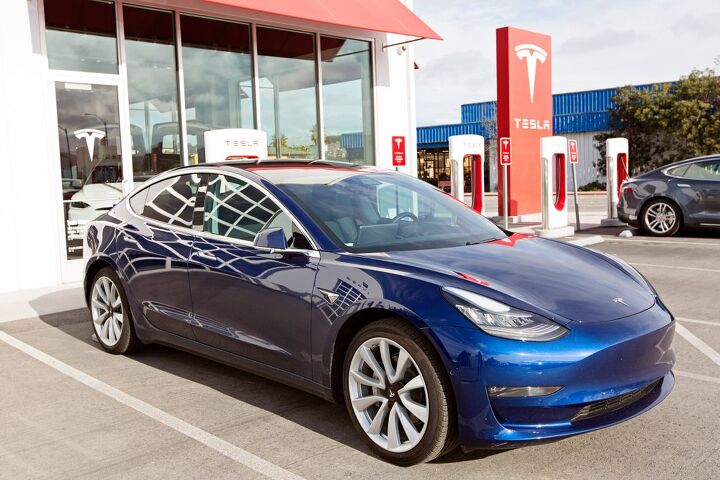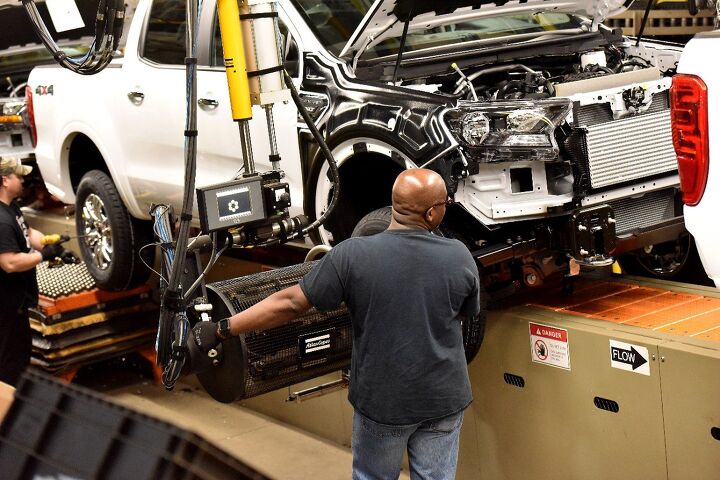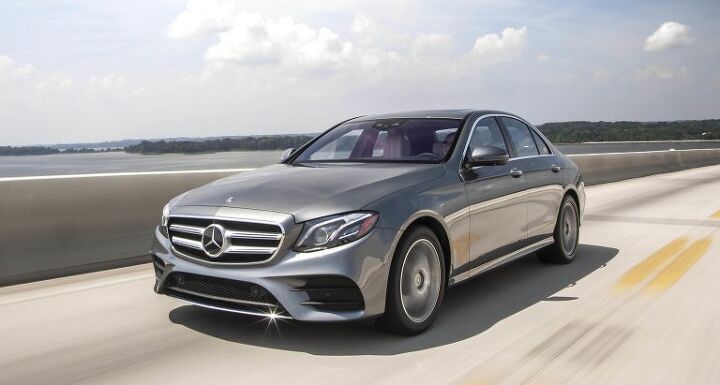#Government
Closest Thing You'll Find to a Tesla Dealership Lands in Michigan
Until January, any Michigan resident hoping to take home a Tesla had to first leave the state. That all changed following an agreement between the state and the automaker, which sued Michigan back in 2016 to protest its protectionist law against direct sales.
Now, the closest thing you’ll find to a true Tesla dealer has appeared outside Detroit.
Start Me Up: As Industry Slides Into Gear, U.S. Requests Industrial Assistance From Mexico
Mexico is considering reopening factories after May 18th, now that automakers and the U.S. government have requested it resume production at plants serving the American market. With supply chains needing time to catch up, vehicle assembly will be precarious until parts can be reliably sourced. And Mexico is an essential part of that industrial recovery plan, necessitating some light coordination with the United States.
Despite seeing a spike in new COVID infections, Mexico released a plan to ease restrictions on Wednesday. Making sure U.S. manufacturers have what they need has been incorporated into that strategy, with a few conditions. While industrial employees will soon head back to work, Mexico made no assurances that it will prioritize supplying the rest of North America with automobiles or their components.
Tesla Vs Alameda County Update: Official Production Could Return Monday
Tesla CEO Elon Musk made waves this past weekend by declaring his Fremont, California assembly plant would resume production in defiance of the stay-at-home orders imposed by Alameda County, bolstering his claim by threatening to move his HQ out of the state. He also fired off a lawsuit for good measure.
Musk wasn’t too pleased with the county’s decision to extend the closure of non-essential businesses through the end of the month, arguing that the governor’s word (allowing a return of statewide manufacturing) held sway.
Late Tuesday, the county issued what it probably hopes is the final word on the matter.
Try and Stop Me: In Defiance of County Orders, Tesla Turns on the Lights
Furious over a decision by county officials to keep all non-essential businesses offline until the end of the month, Tesla CEO Elon Musk announced late Monday that his Fremont, California assembly plant is opening up anyway.
The move comes two days after the automaker filed a lawsuit against Alameda County. In it, Tesla called the county’s order unconstitutional and in violation of California Governor Gavin Newson’s statewide return-to-work mandate. Should county officials call in the cops, Musk wishes to be the only one in cuffs.
Tesla Sues County; Musk Promises to Pick up Toys, Go Home
California announced late last week that it will allow the cautious reopening of manufacturing operations across the state, but Alameda County resisted, claiming it will keep non-essential businesses shuttered until the end of the month.
Guess which county Tesla’s Fremont assembly plant is located in.
Now guess Tesla CEO Elon Musk’s reaction to the country’s announcement. If you speculated that Tesla might sue Alameda Country, with Musk launching an online tirade in which he promises to move Tesla HQ and all future products out of the state, you’d be right.
Whitmer Relents, Ford Goes Back to Work on May 18th
No longer the odd man out among its Detroit rivals, Ford Motor Company has issued an official restart date for North American production. May 18th is to be the beginning of a phased restart, the automaker said, which is in keeping with return dates offered up by General Motors and Fiat Chrysler earlier this week.
After the UAW signaled its approval of those earlier announcements, all that was left was confirmation from Michigan Governor Gretchen Whitmer that workers could indeed return. On Thursday, Whitmer extended the state’s stay-at-home order until May 28th (the measure was previously expected to expire May 15th), but gave auto manufacturers the green light to go ahead.
Fiat Chrysler Posts Big Loss, Eyes Production Restart ASAP
The first quarter of 2020 spilled a tsunami of red ink over Fiat Chrysler’s balance sheet, with the automaker posting a $1.84 billion net loss.
FCA seemed to be the canary in the coal mine when it came to the coronavirus, as the automaker was forced to idle an assembly plant in Europe even when the pandemic was still a regional outbreak in China. Where did the virus then take hold? In Italy, of course — FCA’s European base of operations. You know what came after that.
Seemingly more so than its Detroit rivals, FCA has been eager to get factories back up and running, and the Q1 earnings report only adds to its desire for something approaching normalcy. The folks in Auburn Hills want to open things up starting May 18th.
'We're Ready' Says Ford COO As Company Awaits Lockdown Easing
Ford Motor Company’s chief operating officer, Jim Farley, joined the company’s chief human resources officer, Kiersten Robinson, and manufacturing and labor affairs boss Gary Johnson for a media Q&A Thursday, offering up details on what it will look like when the automaker returns to the business of cranking out cars trucks and SUVs.
That’s already begun in China, where 90 percent of the company’s employees are now back to work. It’s Europe’s turn to come back online now (the region is due to start a ramp-up on May 4th), as the Blue Oval awaits the go-ahead from the state of Michigan.
It all hinges on Michigan, apparently, given the critical mass of manufacturing and suppliers in that locale. When Gov. Whitmer eases shelter-in-place orders, Farley said, the company will leap into action.
Volkswagen and Daimler to Merkel: Spiff Our Rides
Amid steep drops in operating profit and a dismal sales outlook, both Volkswagen and Mercedes-Benz parent Daimler are appealing to the state in a bid to generate sales demand.
Both automakers appealed to the German government for assistance on Wednesday, Reuters reports, ahead of a meeting of auto industry leaders. With vehicle production making up a big part of Germany’s GDP, the shutdowns enacted to slow the spread of COVID-19 has left the sector hurting. That pain is expected to last through 2020.
Locked-down State Opens up Online Auto Sales, Nudging Industry in Direction of Recovery
Don’t expect the Present Year to come close to the sales tallies racked up in 2018 or the year before. No analyst foresees such a scenario; globally, LMC sees auto production taking a 20-percent haircut in 2020.
But the return to normality is underway in the U.S., aided by the federal government’s reopening plan (a set of guidelines to be acted on by individual states), but especially by the realization of governors that car buyers need some way to bring a vehicle home. Michigan, via an executive order, greenlit online sales on April 9th. Now it’s Pennsylvania’s turn.
Easier Said Than Done: Restarting the Automotive Industry
As the global health crisis pivots toward becoming an economic one, the automotive industry is understandably eager to know when it can begin producing cars again. The situation isn’t going to be as easy as throwing open a few breaker boxes and giving the thumbs up. A mile-long list of problems, many of which lack easy answers, will first have to be tackled before things return to normal.
Supply chains will be slow to move — and potentially severed — as other nations wait longer to walk back social distancing measures. Not all factories will resume operation at the same time, and not all parts suppliers or shipping agencies will have made it through the coronavirus pandemic intact. It’s also uncertain how quickly customers will return to the market. In tougher financial times, customers may remain hesitant in making large purchases; meanwhile, localized quarantines will undoubtedly continue suppressing sales in certain markets. Then we have the elephant in the room — the vast amount of money this colossal reboot is going to require.
Ordered Into Action: GM and Feds Announce Ventilator Deal
To its credit, General Motors was already preparing a foray into ventilator production when President Donald Trump invoked the Defense Production Act, locking the automaker into a pact to build truckloads of the life-saving equipment.
On Thursday, details of the no-profit deal became clear.
Gas War: EPA and DOT Release Final Draft of Fuel Rollback
The U.S. Department of Transportation’s National Highway Traffic Safety Administration (NHTSA) and the Environmental Protection Agency (EPA) released their final version of the Safer Affordable Fuel-Efficient (SAFE) Vehicles Rules on Tuesday. This will establish new targets for corporate average fuel economy (CAFE) and emissions standards for passenger vehicles from the 2021-2026 model years and just in the nick of time. The document had to be completed by April 1st, in order to leave sufficient time for the coming model year.
If you’ve been following the long and arduous process that brought us here, you’ll notice the document has changed slightly from previous drafts. The rollback still enacts the straightening of emission regulations but reels them back from the lofty goals set by the Obama administration. Annual increases in fuel efficiency standards will be set at 1.5 percent through 2026. Previous drafts had the Trump administration freezing efficiency requirements at 2020 levels.
Trump Edges Closer to Invoking Defense Production Act
One should never pay too close attention to social media, but sadly, that’s where a lot of diplomacy takes place these days. Especially today.
Since dawn broke over the nation Friday, President Donald Trump has chastised General Motors and Ford for their perceived foot-dragging in getting much-needed ventilators into production, urging them to pick up the pace and suggesting that he might invoke the Defense Production Act — a wartime measure aimed at aligning industrial output with America’s immediate defense needs. In this case, the enemy is microscopic, but packs a punch.
We’re already on it, Ford and GM replied.
The Law Comes for Ex-UAW Boss Gary Jones
Federal authorities have charged former United Auto Workers President Gary Jones with embezzling more than $1 million of union funds.
It’s the latest round of charges and the highest-profile target thus far in the ongoing investigation into corruption among the union’s upper ranks. A criminal information reveals Jones, who resigned as president last November, plans to plead guilty and cooperate with federal investigators.
Three of Jones’ former aides, all of whom were swept up in the corruption probe, provided assistance that led to today’s charges. The former UAW boss was one of several top execs who prosecutors say diverted union funds towards lavish living and toys.





























Recent Comments